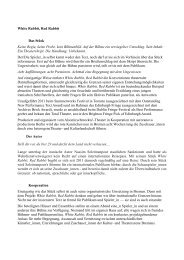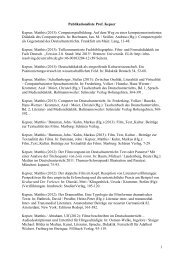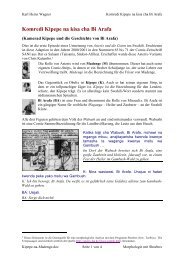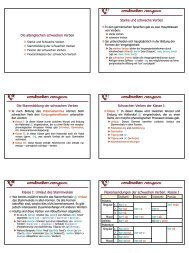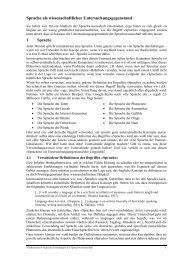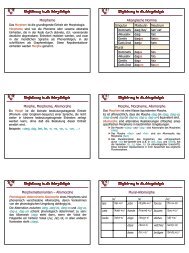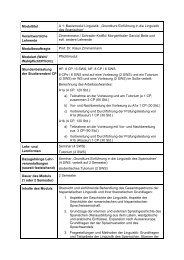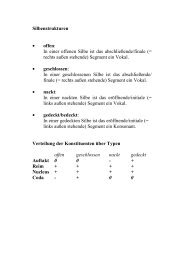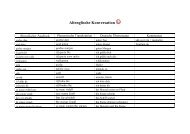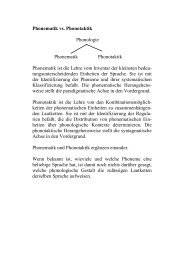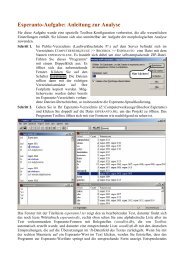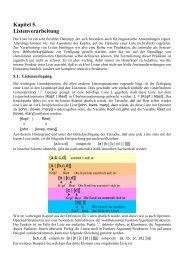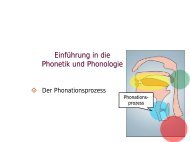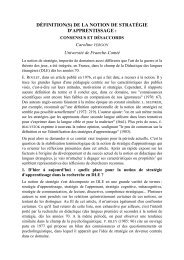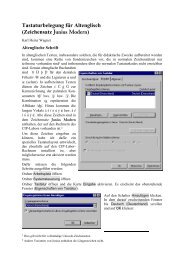Relativism and Universalism in Linguistics - Fachbereich 10 ...
Relativism and Universalism in Linguistics - Fachbereich 10 ...
Relativism and Universalism in Linguistics - Fachbereich 10 ...
You also want an ePaper? Increase the reach of your titles
YUMPU automatically turns print PDFs into web optimized ePapers that Google loves.
Workshop 1 – Abr 145<br />
<strong>and</strong> Dasher 2002), <strong>and</strong> illustrat<strong>in</strong>g that the determ<strong>in</strong>ation of modal type is a result of historical<br />
developments. Abraham (1998-2002) has also shown that historical factors are at issue,<br />
<strong>in</strong>clud<strong>in</strong>g the loss of Old English perfective prefixes <strong>and</strong> the development of def<strong>in</strong>ite articles,<br />
which co-occur with the tendency for deontic modality to associate with perfective ma<strong>in</strong><br />
verbs <strong>and</strong> epistemic modality to be found with imperfective ma<strong>in</strong> verbs. Evidence from a<br />
study of the history of be supposed to reveals that a pre-modal stage of mark<strong>in</strong>g generic<br />
aspectual situations may be found prior to the development of deontic mean<strong>in</strong>gs (Ziegeler<br />
2003; <strong>in</strong> prep.); further evidence is found <strong>in</strong> the case of a core modal, will, for the same<br />
generic aspectual conditions to arise <strong>in</strong> Old English examples, prior to the stage known as<br />
'future-project<strong>in</strong>g modality'. In the latter case, the generic examples studied are all seen to<br />
have generic subjects, thus creat<strong>in</strong>g the mean<strong>in</strong>g of general proclivity rather than <strong>in</strong>tention, a<br />
semantic property of <strong>in</strong>dividuated subjects.<br />
Compositional theories of aspect refer to the need to consider not only verbal semantics but<br />
the semantics of the entire construction of verb plus nom<strong>in</strong>al arguments <strong>and</strong> adjuncts <strong>in</strong><br />
describ<strong>in</strong>g aspect (Verkuyl 1993; 1999). In other studies, e.g. Visconti (2004), <strong>and</strong> as also<br />
suggested by Bybee (1985), the shift to deontic mean<strong>in</strong>gs of be supposed to took place when<br />
the ma<strong>in</strong> verb referred to events tak<strong>in</strong>g place after the moment of speak<strong>in</strong>g (thus entail<strong>in</strong>g<br />
perfective aspect <strong>in</strong> the verb). However, even with a perfective ma<strong>in</strong> verb, the presence of<br />
generic subjects still renders the mean<strong>in</strong>g of the construction truth-conditionally gnomic, <strong>and</strong><br />
such generic uses of the emerg<strong>in</strong>g modal were frequent <strong>in</strong> early stages of development. In the<br />
shift from generic aspectual functions to future-project<strong>in</strong>g modality seen <strong>in</strong> the present<br />
studies, it will be observed that the <strong>in</strong>crease <strong>in</strong> <strong>in</strong>dividuated, specifically-referr<strong>in</strong>g arguments<br />
plays a significant role. However, the present paper will exam<strong>in</strong>e what additional factors may<br />
have been relevant <strong>in</strong> the transition from generic, pre-modal constructions to the futureproject<strong>in</strong>g<br />
modality associated with the development of deontic functions today.



